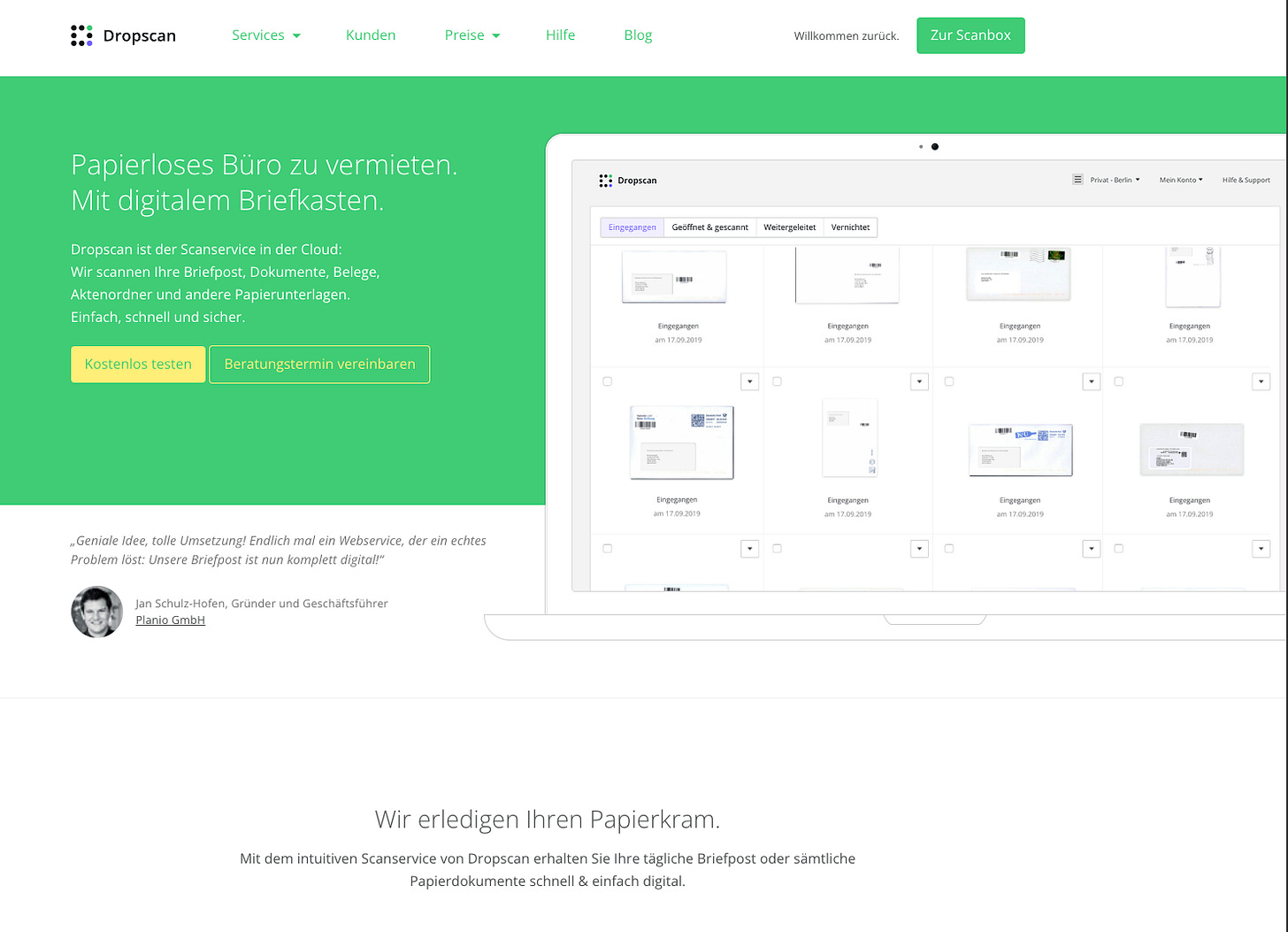From Digitization Idea to Successful Bootstrapped Company: Christian Schulte and Dropscan
Welcome to Volume One of "Happy Bootstrapping"
I'm excited to finally launch this newsletter after much preparation! Here's the first issue featuring content from today's fresh "Happy Bootstrapping" Podcast Episode #112.
Happy Bootstrapping is a German podcast where I interview bootstrapped founders, indie hackers, and solopreneurs about their startup journeys. Over the years, I've connected with many successful entrepreneurs who have built e-commerce shops, SaaS platforms, mobile apps, content businesses, or hybrid models.
From now on, you'll receive two episodes weekly - the latest one every Thursday, and starting from Monday, we'll revisit all the stories beginning from Episode 1.
Digitizing Letters, Making Customers Happy: The Success Story of Dropscan
In the current episode of Happy Bootstrapping, I interviewed Christian Schulte, the founder of Dropscan – a service for digitizing mail and paper documents. Since founding the company in 2011, Christian has built the business without external capital into a profitable enterprise with 30,000 customers and 14 employees. His story is an impressive example of how you can be successful without venture capital.
From Idea to Self-Funded Company
After gaining experience in the VC industry and at an American print-on-demand startup, Christian decided to go the opposite route: instead of printing digital documents, he wanted to digitize paper documents. With two partners, he founded Dropscan and set up a web application within three months. The initial capital was limited to €25,000 for establishing the GmbH (limited liability company), with the three founders strategically contributing their competencies: software development, product development/sales, and scanning services.
"The only thing we ever invested was the starting capital of 25K for the GmbH. We covered certain initial costs with that," explains Christian. The company became profitable within six months, albeit initially without large salaries for the founders.
The Service: Digital Mailroom for Everyone
The heart of Dropscan is a digital mailroom that is completely managed online. Customers receive a Scanbox address to which they can send their mail and documents. These are digitized by Dropscan and made available as searchable PDF files. The customer can decide for each document whether it should be scanned, destroyed, or forwarded.
Particularly clever: The digitized documents can be directly integrated into existing systems such as OneDrive, Google Drive, or accounting software. With a conversion rate of 50% of website visitors to registrations and 80% of registrations to paying customers, Dropscan achieves impressive results.
Business Model and Key Figures
Dropscan operates on a SaaS model with various pricing tiers depending on mail volume. The company processes tens of thousands of letters and documents daily, with some customers sending pallets of materials for digitization. The business has been profitable since 2011 without any external funding or debt.
What's particularly impressive is the efficiency of their operation: with just 14 employees, they serve 30,000 customers worldwide, including DAX corporations like Zalando. They've built their own 1,000+ square meter production center in Berlin, which Christian describes as "probably not the largest in Europe, but likely the most modern."
Success Without Marketing Hype
In contrast to many startups, Christian focuses on organic growth rather than aggressive marketing measures. His focus is on a convincing website and direct customer feedback. Christian and his co-managing director Martin still handle customer service personally to this day.
"With 80 percent of our customers, I've never spoken. They come to the website, try it out, look at it, understand it, and just do it," Christian describes his self-service approach.
This concentration on the product and customer satisfaction has carried Dropscan through times when venture-financed competitors entered the market with subsidized prices and later failed. Christian's philosophy: "Under promise, over deliver" – the opposite of typical marketing hype.
Christian's Learnings from 14 Years of Bootstrapping:
Independence from investors enables true entrepreneurial freedom, including the ability to reject unsuitable customers
Organic growth with a solid customer base is more sustainable than rapid, investor-driven growth
Direct customer contact by the founders is irreplaceable for product improvements and long-term success
Focusing on existing customers takes higher priority than acquiring new customers
"Dropscan is our playground where Martin and I can develop and implement exciting ideas together. And I'm not going to give that up just to have a few million in my account afterwards," Christian summarizes his path of independent entrepreneurship.
Conclusion
What I particularly appreciated about Christian's story is his remarkably calm, customer-centric approach. I initially thought his business might be struggling since their blog hadn't been updated since 2022, but Christian explained this intentional choice: "We don't have time for that, we focus on the customers." I was especially impressed that both Christian and his co-founder Martin still personally handle customer support. This commitment to maintaining direct customer contact is, in my view, absolutely vital to their success, ensuring they never lose touch with the people using their service.
Did you enjoy the episode?
Please let me know if you have any questions or feedback - thanks!


